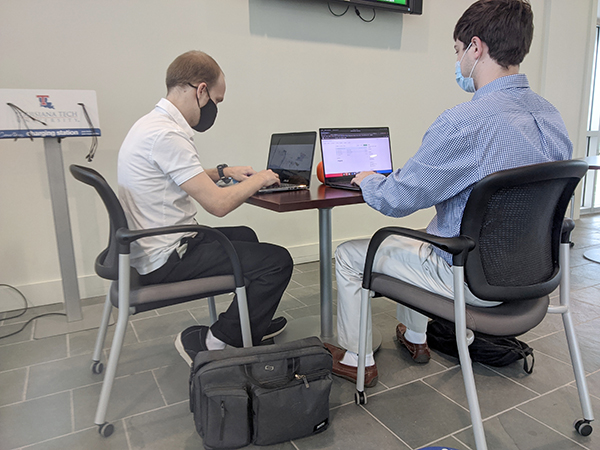Cary Randazzo, left, and Branson Hanzo, right, are two of the interns involved in the AFGSC Internship Pilot Program. The program is a partnership with AFGSC, the Cyber Innovation Center in Bossier City, La., and Louisiana Tech University in Ruston, La., to collaborate with AFGSC on research and development needs. (Courtesy photo)
Sean Green | STRIKEWERX Marketing and Communication Director
BOSSIER CITY, La. — Air Force Global Strike Command has partnered with the Cyber Innovation Center in Bossier City, Louisiana, and Louisiana Tech University in Ruston, Louisiana, to create the AFGSC Internship Pilot Program.
Administered through the existing Partnership Intermediary Agreement with the CIC, the CIC and Louisiana Tech have provided 13 interns and four professors to collaborate with AFGSC on research and development needs. Starting in June of 2020, the pilot internship will last for a full year.
Through the PIA, the command is able to capitalize on existing local resources to catapult innovation and create an environment of sustained evolution.
“While the program is still in the starting phase, it is incredible to see the energy and outside expertise these students are able to provide to the command,” said Jeff Beene, director of the PIA.
Dr. Sumeet Dua, co-lead of the Internship Pilot Program, explained that this program enables a unique opportunity for LA Tech students and faculty to effectively address the problems of interest to partners at the AFGSC.
“The LA Tech research team represents multiple academic colleges on our campus to embody the principles of interdisciplinary research and experiential education to support these internship endeavors,” he said. “We are thrilled to cultivate a talented pool of students to serve our partners’ needs and the defense of our nation through this program.”
The interns are a mix of undergraduate and graduate students from La Tech with a variety of academic backgrounds. Each intern is assigned to one of three focus areas within AFGSC: Portfolio-Level Digital Engineering Platform, Nuclear Command, Control, and Communications Center, or Knowledge Management.
With the assistance of their faculty lead, the interns are partnering with AFGSC Project Champions to provide innovative solutions to these three focus areas.
“This project gives experience through doctorial training at a more advanced level in order to really understand how a project begins and the process to see it finished,” said Dr. Mitzi Desselles, the Louisiana Tech faculty lead for the Knowledge Management focus area. “I want to start building a bridge with AFGSC so that we can explore additional projects. You can’t just knock on the door of the military and ask to do research with them, you have to build that trust and have a relationship.”
“Having the ability to capitalize on the organic capabilities and expertise at Louisiana Tech, while mentoring the interns on the ins and outs of the military and civil service is truly a win-win,” said Maj. Frank Perry, project champion for the Knowledge Management focus area.
His project is staffed by Industrial/Organizational Psychology Doctoral Candidates that have completed their academic work and are working on their dissertations.
“The ability to tap into that expertise, and to potentially add that to the long-term capabilities of DoD and the Air Force is a huge force enabler,” Perry said.
He added that Knowledge Management is a quickly evolving skillset that many commands solve via large contracts. By executing the internship through the CIC, these costly contracts can be avoided while still growing Knowledge Management capabilities.
“By tapping into academia at a fraction of the cost, we have cracked the code on bringing the right expertise to aid our mission, while simultaneously providing valuable experience to our interns,” Perry explained.
One benefit of this program is the knowledge transfer that broadens horizons for both the students and AFGSC Project Champions. It also provides experience and an outreach to academia per AFGSC’s technology transfer and transition objectives.
“I would hope that the interns leave with a sense of accomplishment of what they have done, as a critical piece of General Timothy Ray’s expectations outlined in the 2020 Strategic Plan,” Maj. Perry said. “And, I would hope that we have been able to provide an example that the Nuclear Community is innovative, collaborative, and leading the way in the use of current technologies and processes.”


